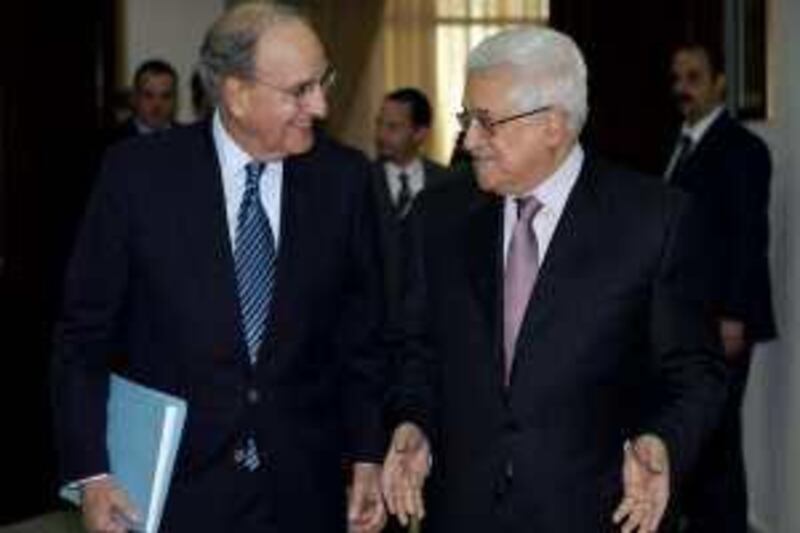RAMALLAH // Samer Arar, 26, was not impressed with the visit on Friday of George Mitchell, the US Middle East envoy. Mr Mitchell was in Ramallah for talks with Mahmoud Abbas, the PLO leader, in a renewed, and so far fruitless, US effort to get a peace process between Palestinians and Israelis going again.
A waiter in a restaurant in central Ramallah, Mr Arar said Mr Mitchell's efforts were "for nothing". "American and Israeli politics will not allow for any breakthroughs," said Mr Arar, displaying the kind of grasp of contemporary politics that is common on the Palestinian street. "It's not just that the Americans are biased towards Israel; even if they weren't, there is no political will in America to push the Israelis."
Such lack of faith in current political possibilities is not confined to the street. Mr Abbas yet again reiterated to Mr Mitchell, according to Saeb Erekat, the PLO's chief negotiator, that there could be no return to negotiations unless Israel abides by its obligations. Under a 2002 peace plan originally formulated by Mr Mitchell in a previous role and adopted the following year by the Quartet - the US, UN, EU and Russia - as its road map for peace, Israel was to freeze all settlement construction in occupied territory, including East Jerusalem, which it has failed to do.
This Palestinian insistence comes from years of frustration with negotiations. Since the Oslo agreement in 1993, talks have failed to lead to the promised statehood even as settlements continued to expand and the number of Jewish settlers in occupied territory more than doubled. Negotiations under such conditions have come to be seen by Palestinians as no more than a cover for Israeli settlement building that, in turn, prejudices the outcome of a peace process.
"Ultimately, the Palestinian side, after all these years, is convinced that negotiations for negotiations' sake will not work any more," Mustafa Abusway, a professor of political science at Al Quds University in Jerusalem, said. "Anyone who understands the conflict understands that it is time for Israel to make bold moves." There is little sign of any such bold moves. On the contrary, on Friday night Benjamin Netanyahu, the Israeli prime minister, castigated the PLO for setting "preconditions" before talks start.
The Palestinians, a statement from Mr Netanyahu's office read, "are the ones that are preventing the relaunch of the peace process with their preconditions that they have never asked before from any previous Israeli government." Mr Netanyahu went on to say he was ready for talks with the Palestinians, but many believe the Israeli government would be hamstrung in any negotiation. Indeed, at the first sign that any substantive efforts are made on issues such as Jerusalem, opinion is that this would probably cause the collapse of the right-wing coalition propping up Mr Netanyahu.
In all, the outlook for any peace process is grim, as Barack Obama, the US president, himself acknowledged in a recent interview with Time magazine. "This is just really hard," Mr Obama said with respect to US efforts to mediate peace between the two sides. His remarks, along with the lack of any US letters of guarantee to both sides to entice them back to the negotiating table, are the clearest sign yet that Washington is now seeking to lower expectations for its mediation efforts, analysts say.
"It seems the American administration has learnt from previous experience not to set parameters too high," Mr Abusway said. As long as Washington is not prepared to pressure Israel, and having realised that the Palestinian side has "nothing left to lose", said Prof Abusway, the US would now take a back seat and work to prevent the status quo from deteriorating into violence. "Nature abhors a vacuum. But I think the current impasse can continue for a long time."
okarmi@thenational.ae





